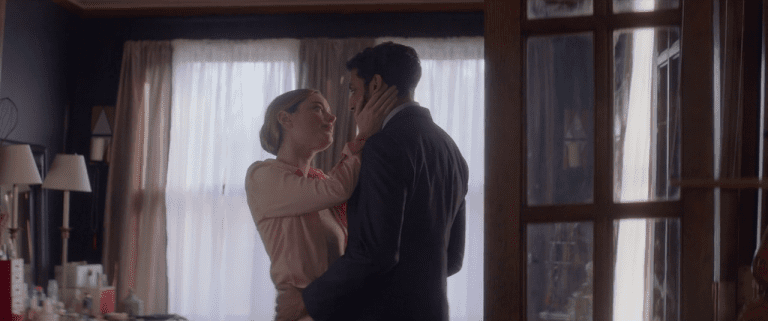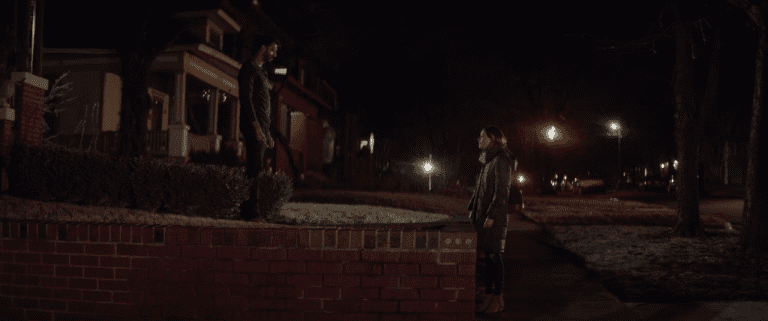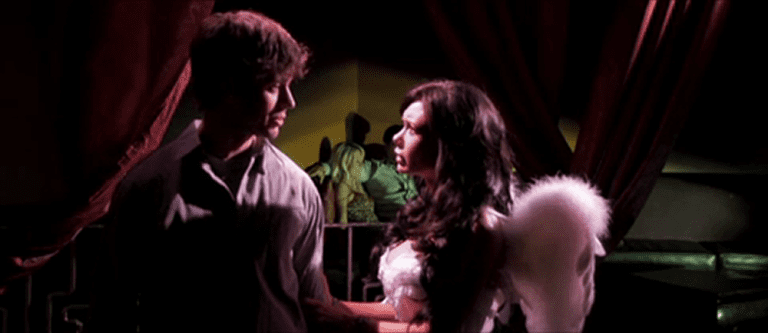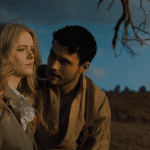On Monday, I looked at three films from the 20th century that alluded to the story of Hosea and Gomer without directly dramatizing it. Today, I’m looking at three films from the 21st century that dramatize the story while connecting it to the present day.
Two of these films – Oversold (2008) and Hosea (2019) – actually move the story to the present day, and they are both set in the United States. The third, Amazing Love: The Story of Hosea (2012), is the only existing film I know of that sets the story in its original biblical context, but even this film uses a modern-day framing device, in which a pastor tells the biblical story to some youth-group kids on a camping trip.
I thought about reviewing each film individually but there are some interesting overlaps between them – and they even have some things in common with Redeeming Love, which moves the story to 19th-century California and is coming to theatres this Friday. So I figured I’d look at all three films together, and see how they handle similar themes.
First, though, a bit of set-up regarding the three films:
Oversold is a 32-minute short film about a pastor named Josh who marries a Las Vegas stripper named Sophi, and who ends up quitting his job when members of his church reject his new wife. Notably, the film was produced by a church, is narrated by a real-life pastor, and stars a former porn star named Crissy Moran as Sophi – so the film models the very mercy and advocacy that is written into the story.
Amazing Love: The Story of Hosea stars Sean Astin as a pastor who tells the story of Hosea and Gomer to some teenagers on a camping trip when he senses that some of them are giving a girl the cold shoulder for being too worldly. The flashbacks to the biblical story make up maybe half of the film’s 80-minute running time.
And finally, Hosea is an indie drama of the sort you’d find at Sundance (it actually premiered at the Napa Valley Film Festival), in which a prostitute named Cate is reunited with a childhood friend named Henry and starts a family with him. Eventually the pressure of hiding her past from her husband’s middle-class peers – one of whom turns out to be a former client of hers – gets to her and she reverts to her previous lifestyle.
One thing all three films have in common is that they prioritize the relationship between Homer and Gomer in a way that the biblical text does not. In the text, the marriage between Hosea and Gomer is a symbol of the relationship between God and Israel, and it occupies only the first three chapters in a thirteen-chapter book. But two of these films ditch the Israelite context altogether, while Amazing Love situates the prophecies of Hosea within the story of his marriage instead of treating the marriage as a prologue to the prophecies.
One result of this focus on the marriage is that all three films “flesh out” the Hosea and Gomer characters in a way that the Bible does not. The biblical Gomer has no voice whatsoever, and the biblical Hosea, speaking on God’s behalf, never says anything about his own feelings or motivations. But a drama needs three-dimensional characters – people who have emotions and an inner life – so all three films fill in the gaps.
This has the curious effect of creating more sympathy for the Gomer figure, in particular. While the Bible suggests that she was something of an insatiable nymphomaniac, these films make a point of showing that their Gomer figures are dealing with other issues, such as abusive boyfriends and pimps, drug habits, and memories of being molested. Instead of denouncing their Gomer figures, these films ask us to understand them.
Religion itself becomes one of the things that drives these Gomers to leave their Hoseas.
In Oversold, Sophi is rejected by the church her husband leads, and, while her abusive boyfriend isn’t religious at all, the visual association between religion and abuse is underlined by the fact that he wears a shirt with crosses on the front and back the first time we see him. We later see him wearing a crucifix on a necklace, too.
In Hosea, Cate associates figures of the Virgin Mary with the abuse she suffered as a child at the hands of her father’s co-worker, and she is turned off when one of her husband’s friends – the wife of a former client of Cate’s, as it happens – offers to pray for her. (Cate does, however, seem to identify with one of the Virgin Mary figures at a low point in her life later on, when she sees it splashed with mud and she tries to scrub it clean.)
And in Amazing Love, Gomer herself protests that her children are being ridiculed because Hosea keeps giving them prophetic names like ‘No Mercy’ and ‘Not My People’. She also complains that she is being mocked by their neighbours because of Hosea’s preaching. “Perhaps if God was not so judgmental,” she says, “the people would respond.”
What’s more, just as these films create more sympathy for their Gomer figures, they also make their Hosea figures vulnerable to criticism in a way that he isn’t in the Bible.
For example, why does Hosea marry Gomer? In the Bible, it simply says that God told him to find a promiscuous woman and marry her, to use her as an example of Israel’s infidelity to God. But in all three of these films, the Hosea figure is in love with the Gomer figure, which raises questions about his own psychological reasons for being in the relationship.
In Hosea, Henry is even a former childhood friend of Cate’s – which raises the possibility that he was pursuing a memory of her after his previous adult relationships failed.
And in all three films, the Gomer figures voice criticisms of the Hosea figures that have at least some merit. In Oversold, when Josh confronts Sophi for keeping her work as a stripper secret from him, she responds that he is no better because he hasn’t told his church about their relationship yet. In Amazing Love, Gomer’s objections to Hosea’s prophetic work – the judgmental utterances, the bleak names he gives their kids – are compounded by the fact that he doesn’t look after their finances very well.
And in Hosea, Cate tells Henry in a moment of frustration, “I’m not one of your projects!” This is just before her downward spiral, back into a life of addiction, prostitution, and ultimately a suicide attempt. But when she comes out of it – rescued by Henry, who puts her in a hospital and leaves her with two notes, one for in case she wants to come home and one for in case she doesn’t – she returns to him, and on her own terms.
This is their final exchange, as he stands outside their house and she stands a few steps down on the sidewalk:
Cate: There’s good inside of me. It’s good right now. Not later when I’m fixed. Right now, I’m good. For as long as I can remember, I didn’t believe that.
Henry: I love you, Cate.
Cate: And when you say that to me, every time it’s like you’re trying to cover me up with it, like if you layer that love on top of me, you wouldn’t have to see what’s really here.
Henry: What do you want?
Cate: I can’t go up there. But you can love me down here.
And then – just as Henry moves – the film cuts to black.
Oversold and Amazing Love are both narrated by pastors (one real, the other fictitious) who make a point of tying Hosea’s story to the salvific work of Jesus. Hosea, on the other hand, has its doubts about the “male saviour” narrative, and leaves us thinking that reconciliation needs to be a two-way street.
What that implies for the relationship between God and Israel, or between God and any other person or group of people, is a subject for another day.
Though if one is inclined to see Hosea and his message of mercy as a progression from the more punitive approach of some of the earlier parts of the Old Testament – which is how Hosea’s message was framed in The Green Pastures (1936) – one could look at Henry’s movement as a further step towards kenosis, the self-emptying of a God who brought himself down to our level in the person of Jesus (cf. Philippians 2:5-8).
Anyway. Here, in the meantime, are some other patterns I noticed while revisiting these films – things they have in common, and areas where they tug in different directions:
Whose story is it? Oversold’s big marketing hook is that it features a former porn star as Sophi, but the film actually begins and ends with Pastor Josh. Amazing Love strikes a balance, with Gomer walking across the landscape during the opening credits, and Hosea welcoming a potential follower into his house at the end. Hosea, despite its title, clearly privileges Cate’s perspective rather than Henry’s throughout its narrative arc.
Children. There are no children in Oversold. Henry and Cate have a child in Hosea. Hosea and Gomer have children in Amazing Love, just as they do in the Bible, and Gomer asks why Hosea (or, through him, God) keeps giving their kids such bizarre-sounding names.
The other man (or men). The Hosea figures in two of these films have unexpectedly close connections to the “other men” that their wives have been with. In Oversold, Sophi leaves a man named Ethan before dating Josh, and it is only after she and Josh have fallen in love that she learns Ethan is Josh’s stepbrother; she later goes back to Ethan. Meanwhile, in Hosea, one of Henry’s business partners is a former client of Cate’s; Cate does not go back to him, but an encounter with him does prompt her to go back to her pimp. (Without getting into spoilers, suffice it to say that one of the men who has been with the Gomer figure in Redeeming Love has a close connection to that film’s Hosea figure, too.)
Also worth noting: the “other men” in Oversold and Amazing Love are fairly one-dimensional villains, and Henry’s business partner in Hosea isn’t much better – but Cate’s pimp, while clearly exploitative, is not inhuman. You can understand why Cate was with him in the first place, and why she might have gone back to him.
Positive spin. In Amazing Love, after Hosea buys Gomer back from slavery, he tells her, “You shall not be for another, and I shall be for you always.”
That isn’t quite what the biblical Hosea says. In the text, he says, “You are to live with me many days; you must not be a prostitute or be intimate with any man, and I will behave the same way toward you” (Hosea 3:3). It may sound like a profession of mutual fidelity, but some interpreters have argued that Hosea was actually telling Gomer she would have to go without sex at all – even with him – because the very next verse says their abstinence will represent how the Israelites are going to have to live “without king or prince, without sacrifice or sacred stones” for “many days”.
Christianity. As noted above, Oversold and Amazing Love are narrated by evangelical pastors who clearly connect the story of Hosea to the salvific work of Jesus.
There is even an implied link between Hosea and Jesus in the name of Oversold’s Hosea figure, Pastor Josh. There are actually multiple people named Hosea (or Hoshea) in the Bible, and one of them was renamed Joshua by Moses (Numbers 13:16). And Joshua, in turn, is the Hebrew name that, via Greek, became the name Jesus.
Change acknowledgement. The narrators in Oversold and Amazing Love are also both careful to point out the differences between their versions of the Hosea story and the biblical version of the Hosea story. The narrator in Oversold emphasizes what his version leaves out (he says the biblical story was much more “messy”), while the narrator in Amazing Love emphasizes what his version puts in (he says he’s expanding the narrative so that the kids from his youth group “can get a little more appreciation for the facts”).
Other Bible passages. Oversold opens with Josh giving a sermon based on Matthew 9:9-13, where Jesus is asked why he eats with “sinners” and he replies by quoting Hosea 6:6 (“I desire mercy, not sacrifice”). When Josh decides to marry Sophi, and later when he decides to “buy her back” by paying off her debts, the narrator tells us a “still small voice” told Josh to do these things; the phrase comes from a description of God speaking to Elijah (I Kings 19:12). When Josh gets into a fistfight with Ethan, Ethan says, “Whatever happened to ‘turn the other cheek,’ huh?” The phrase “turn the other cheek” comes from the Sermon on the Mount / Plain (Matthew 5:39, Luke 6:29).
In Amazing Love, when the church kids discuss their favorite Bible passages, one of them quotes Romans 3:23 (“For all have sinned and fall short of the glory of God”), which fits with the idea that everyone needs a little mercy. The pastor also quotes Numbers 32:23 (“Your sin will find you out”). Most of Hosea’s pronouncements come from the Book of Hosea, but at one point he quotes a denunciation of idols from Psalm 115.
Sex. The two overtly Christian films – Oversold and Amazing Love – don’t really play up the promiscuity of their Gomer figures at all. It’s not even clear that the Gomer figures in those films have more than one lover aside from their husbands: Sophi is a stripper whose boyfriend pressures her to take part in a porn film, though Josh intervenes before the film is made, while Gomer – who is certainly accused of promiscuity by her neighbours – is seen only in the company of a wealthy married man who not only says he will leave his wife for her, but actually does so. (The narrator in Amazing Love even goes so far as to say that we don’t know if Gomer was already promiscuous when Hosea married her, though it seems pretty clear from Hosea 1:2 that she must have been.)
These two films also avoid any explicit or even suggestive depiction of sex, whether in or out of marriage. In Hosea, on the other hand, there is implied sex in both contexts, but it is kept out-of-frame and the characters keep most of their clothes on while it’s happening. Redeeming Love, which is rated PG-13 and has been explicitly marketed as a “faith-based” film, will go further than any of these films in its depiction of sex.
Troubled homes. Divorce and inattentive parents are a recurring theme in Amazing Love and Hosea. In Amazing Love, the ostracized teenager is living with her grandmother because her mother keeps moving in with one boyfriend after another; the pastor’s wife eventually reveals that she, too, comes from a broken home. In Hosea, Henry’s parents divorce when he is young, while Cate’s are heard fighting. When Henry and Cate start living together years later, Henry says it’s important for them to go to certain social functions together because investors in his business need to see that he’s a stable family man.
Redeeming Love will similarly fill in the backgrounds of its Hosea and Gomer figures: Angel is the daughter of an unmarried woman who, like Fantine in Les Miserables, turns to prostitution out of economic desperation; while Michael is the son of a plantation owner who was beaten by his father for wanting to free the slaves. It is because Michael had a bad childhood of his own that he can tell Angel to leave her past behind.
Self-harm. In Hosea, Cate wears gloves to hide the fact that she is a “cutter”, i.e. someone who habitually cuts her arms and legs as a coping mechanism for psychological stress. Her penchant for pain gets in the way of her sex life with Henry when he notices that she is holding her hand over a candle during a particularly intimate moment.
There is nothing quite like this in Oversold, but there is a scene in which Sophi shatters a glass on the bathroom floor and then kneels down and pounds the floor with her fists, which results in bloodied hands and wrists. It’s not a deliberate act of self-harm like what Cate does; it almost seems like the shards of broken glass just got in the way.
Connections with other Hosea movies. In Oversold, Sophi’s stage name is “Angel”, just like the protagonist’s assumed name in Redeeming Love.
In Hosea, the adult Henry arranges to meet Cate for the first time in years by paying for a sex-free appointment with her, just as the male protagonist in Redeeming Love will pay to spend time with Angel – but not to have sex with her – in the brothel.
In Hosea, Cate pursues a career in photography. This is reminiscent of how the Capucine character in Walk on the Wild Side (1962) was a painter and a sculptor before she turned to prostitution. These women aren’t just sex workers, they’re artists. They have souls.
In Hosea, Henry makes a point of leaving two different notes for Cate in the hospital, one for if she decides to come back to him and one for if she decides to stay away. Redeeming Love will similarly point towards the need to let Angel exercise her free will.
Trivia. In Amazing Love, the pastor is played by Sean Astin, and his wife is played by Erin Bethea. Previously, Bethea played Kirk Cameron’s wife in Fireproof (2008). Astin and Cameron played best friends in Like Father Like Son (1987).
–
Oversold (dir. Paul Morrell, 2008) is available for purchase and streaming at Amazon.
Amazing Love: The Story of Hosea (dir. Kevin Downes, 2012) is available to stream on Tubi.
Hosea (dir. Ryan Daniel Dobson, 2019) is available to rent and purchase on VOD.
— The images above are from (in order) Hosea, Amazing Love, Hosea, and Oversold.

















